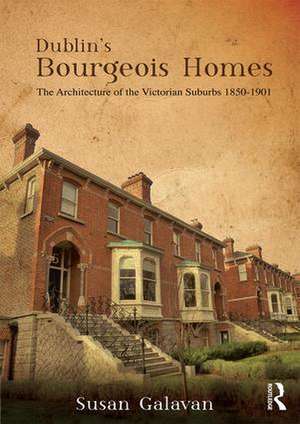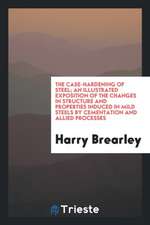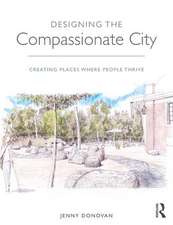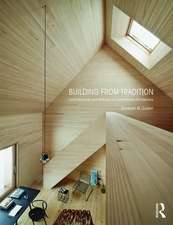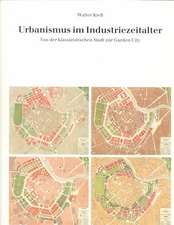Dublin’s Bourgeois Homes: Building the Victorian Suburbs, 1850-1901
Autor Susan Galavanen Limba Engleză Hardback – 3 mai 2017
Dublin’s Bourgeois Homes is the first in-depth analysis of the city’s upper middle-class houses. Focusing on the work of three entrepreneurial developers, Susan Galavan follows in their footsteps as they speculated in house building: signing leases, acquiring plots and sourcing bricks and mortar. She analyses a select range of homes in three different districts: Ballsbridge, Rathgar and Kingstown (now Dun Laoghaire), exploring their architectural characteristics: from external form to plan type, and detailing of materials. Using measured surveys, photographs, and contemporary drawings and maps, she shows how house design evolved over time, as bay windows pushed through façades and new lines of coloured brick were introduced. Taking the reader behind the façades into the interiors, she shows how domestic space reflected the lifestyle and aspirations of the Victorian middle classes. This analysis of the planning, design and execution of Dublin’s bourgeois homes is an original contribution to the history of an important city in the British Empire.
| Toate formatele și edițiile | Preț | Express |
|---|---|---|
| Paperback (1) | 297.99 lei 6-8 săpt. | |
| Taylor & Francis – 18 oct 2018 | 297.99 lei 6-8 săpt. | |
| Hardback (1) | 766.92 lei 6-8 săpt. | |
| Taylor & Francis – 3 mai 2017 | 766.92 lei 6-8 săpt. |
Preț: 766.92 lei
Preț vechi: 1029.01 lei
-25% Nou
Puncte Express: 1150
Preț estimativ în valută:
146.78€ • 152.83$ • 124.04£
146.78€ • 152.83$ • 124.04£
Carte tipărită la comandă
Livrare economică 10-24 martie
Preluare comenzi: 021 569.72.76
Specificații
ISBN-13: 9781472471727
ISBN-10: 1472471725
Pagini: 182
Ilustrații: 73
Dimensiuni: 174 x 246 x 16 mm
Greutate: 0.6 kg
Ediția:1
Editura: Taylor & Francis
Colecția Routledge
Locul publicării:Oxford, United Kingdom
ISBN-10: 1472471725
Pagini: 182
Ilustrații: 73
Dimensiuni: 174 x 246 x 16 mm
Greutate: 0.6 kg
Ediția:1
Editura: Taylor & Francis
Colecția Routledge
Locul publicării:Oxford, United Kingdom
Cuprins
Introduction
1 The architecture of Dublin’s bourgeois homes
2 The domestic realm: inside the semi-detached house
3 Control: land tenure and infrastructure
4 Builders, speculators and labourers
5 Process: building materials
Conclusion
1 The architecture of Dublin’s bourgeois homes
2 The domestic realm: inside the semi-detached house
3 Control: land tenure and infrastructure
4 Builders, speculators and labourers
5 Process: building materials
Conclusion
Notă biografică
Susan Galavan is a qualified architect and holds a first class Masters degree from University College Dublin and a PhD in architectural history from Trinity College Dublin. Her doctorate was a multidisciplinary examination of Dublin’s Victorian domestic architecture, funded by a three-year scholarship from the Irish Research Council. She is currently a Postdoctoral Research Fellow at the Department of Architecture, University of Leuven, Belgium.
Recenzii
"Galavan’s presentation of histories is mediated through portraits and other illustrations… The familiar becomes extraordinary. Descriptions of materials and stone-quarrying, along with readings of brilliant masters and doctoral research give the reader access to highly specialised knowledge."
Ellen Rowley, History Ireland
"Aside from the architectural evolution that Galavan traces, there is an interesting analysis of how domestic space reflected the lifestyle and aspirations of Dublin’s Victorian Upper-Middle classes. She demonstrates how the internal layout articulates the relationship between master and servant, male and female, adult and child."
Deirdre Conroy, Irish Arts Review
"[…] Susan Galavan’s book represents an immensely welcome restitution of a traditional strand in construction history. It also has a new ingredient. Since she is an architect as well as a historian she takes a particular interest in the planning of suburban houses and she illustrates her arguments with plans and drawings of the kind which only theSurvey of Londoncan match [...] .for anyone interested in the Victorian building world, whether they have been to Dublin or not, this is an admirably rounded account of processes which are all too easily overlooked."
Robert Thorne, Construction History
"Galavan’s presentation of histories is mediated through portraits and other illustrations… The familiar becomes extraordinary. Descriptions of materials and stone-quarrying, along with readings of brilliant masters and doctoral research give the reader access to highly specialised knowledge."
Ellen Rowley, History Ireland
"Dublin’s Bourgeois Homes is a comprehensive analysis of the 19th-century development of Dublin’s prosperous inner suburbs […] Galavan’s book provides fascinating insight into both the architecture of the houses and the ways in which these still much sought-after suburbs evolved […] its rigorous analysis of house typologies is presented in an engaging and meaningful way, making it accessible to the non-expert. In an era of ever-increasing awareness of the importance of conservation of architectural heritage, this book provides context for home owners who struggle to understand the merits of conservation and helps to elucidate the enduring legacy of the residential architecture beyond a single generation."
Carole Pollard, Architectural Histories (EAHN)
"[…] Susan Galavan’s book represents an immensely welcome restitution of a traditional strand in construction history. It also has a new ingredient. Since she is an architect as well as a historian she takes a particular interest in the planning of suburban houses and she illustrates her arguments with plans and drawings of the kind which only theSurvey of Londoncan match [...] .for anyone interested in the Victorian building world, whether they have been to Dublin or not, this is an admirably rounded account of processes which are all too easily overlooked."
Robert Thorne, Construction History
"Aside from the architectural evolution that Galavan traces, there is an interesting analysis of how domestic space reflected the lifestyle and aspirations of Dublin’s Victorian Upper-Middle classes. She demonstrates how the internal layout articulates the relationship between master and servant, male and female, adult and child."
Deirdre Conroy, Irish Arts Review
"The breadth of this study is impressive and goes well beyond an architectural history of Dublin’s Victorian suburbs. […] For anyone seeking to understand the long-term impact which Georgian design had on suburban Dublin, how middle-class Victorians lived and how the modern city has been shaped by its Victorian ancestors, this book is a must."
Lisa Marie Griffith, Irish Economic and Social History 46(I)
"Galavan is adept at reading the nuances of the house plan, developing a reasoned exposition of its variation over time and making an equally convincing analysis of its three-dimensional expression. She brings the characters and motives of three Dublin business men firmly into focus while also uncovering the imperial and family networks that enabled them to amass substantial property fortunes."
Finola O'Kane, Urban History
Ellen Rowley, History Ireland
"Aside from the architectural evolution that Galavan traces, there is an interesting analysis of how domestic space reflected the lifestyle and aspirations of Dublin’s Victorian Upper-Middle classes. She demonstrates how the internal layout articulates the relationship between master and servant, male and female, adult and child."
Deirdre Conroy, Irish Arts Review
"[…] Susan Galavan’s book represents an immensely welcome restitution of a traditional strand in construction history. It also has a new ingredient. Since she is an architect as well as a historian she takes a particular interest in the planning of suburban houses and she illustrates her arguments with plans and drawings of the kind which only theSurvey of Londoncan match [...] .for anyone interested in the Victorian building world, whether they have been to Dublin or not, this is an admirably rounded account of processes which are all too easily overlooked."
Robert Thorne, Construction History
"Galavan’s presentation of histories is mediated through portraits and other illustrations… The familiar becomes extraordinary. Descriptions of materials and stone-quarrying, along with readings of brilliant masters and doctoral research give the reader access to highly specialised knowledge."
Ellen Rowley, History Ireland
"Dublin’s Bourgeois Homes is a comprehensive analysis of the 19th-century development of Dublin’s prosperous inner suburbs […] Galavan’s book provides fascinating insight into both the architecture of the houses and the ways in which these still much sought-after suburbs evolved […] its rigorous analysis of house typologies is presented in an engaging and meaningful way, making it accessible to the non-expert. In an era of ever-increasing awareness of the importance of conservation of architectural heritage, this book provides context for home owners who struggle to understand the merits of conservation and helps to elucidate the enduring legacy of the residential architecture beyond a single generation."
Carole Pollard, Architectural Histories (EAHN)
"[…] Susan Galavan’s book represents an immensely welcome restitution of a traditional strand in construction history. It also has a new ingredient. Since she is an architect as well as a historian she takes a particular interest in the planning of suburban houses and she illustrates her arguments with plans and drawings of the kind which only theSurvey of Londoncan match [...] .for anyone interested in the Victorian building world, whether they have been to Dublin or not, this is an admirably rounded account of processes which are all too easily overlooked."
Robert Thorne, Construction History
"Aside from the architectural evolution that Galavan traces, there is an interesting analysis of how domestic space reflected the lifestyle and aspirations of Dublin’s Victorian Upper-Middle classes. She demonstrates how the internal layout articulates the relationship between master and servant, male and female, adult and child."
Deirdre Conroy, Irish Arts Review
"The breadth of this study is impressive and goes well beyond an architectural history of Dublin’s Victorian suburbs. […] For anyone seeking to understand the long-term impact which Georgian design had on suburban Dublin, how middle-class Victorians lived and how the modern city has been shaped by its Victorian ancestors, this book is a must."
Lisa Marie Griffith, Irish Economic and Social History 46(I)
"Galavan is adept at reading the nuances of the house plan, developing a reasoned exposition of its variation over time and making an equally convincing analysis of its three-dimensional expression. She brings the characters and motives of three Dublin business men firmly into focus while also uncovering the imperial and family networks that enabled them to amass substantial property fortunes."
Finola O'Kane, Urban History
Descriere
This book is the first in depth analysis of Dublin’s upper middle-class homes. Using measured surveys, photographs, and contemporary drawings and maps, it analyses a range of premium houses in three different districts: Ballsbridge, Rathgar and Kingstown (now Dun Laoghaire). It explores their architectural characteristics: from external form to plan type, and detailing of materials. Taking the reader behind the façade to the interior spaces within, it reveals how domestic space reflected the lifestyle of Dublin’s Victorian bourgeoisie. Focusing on the work of three entrepreneurial developers, it follows in their footsteps as they speculated in house building: signing leases, acquiring plots and sourcing bricks and mortar. It shows how house design evolved over time, as bay windows pushed through façades and new lines of coloured brick were introduced. Comparisons are made with similar house types in Britain, showing the unique characteristics of the Dublin house form.
